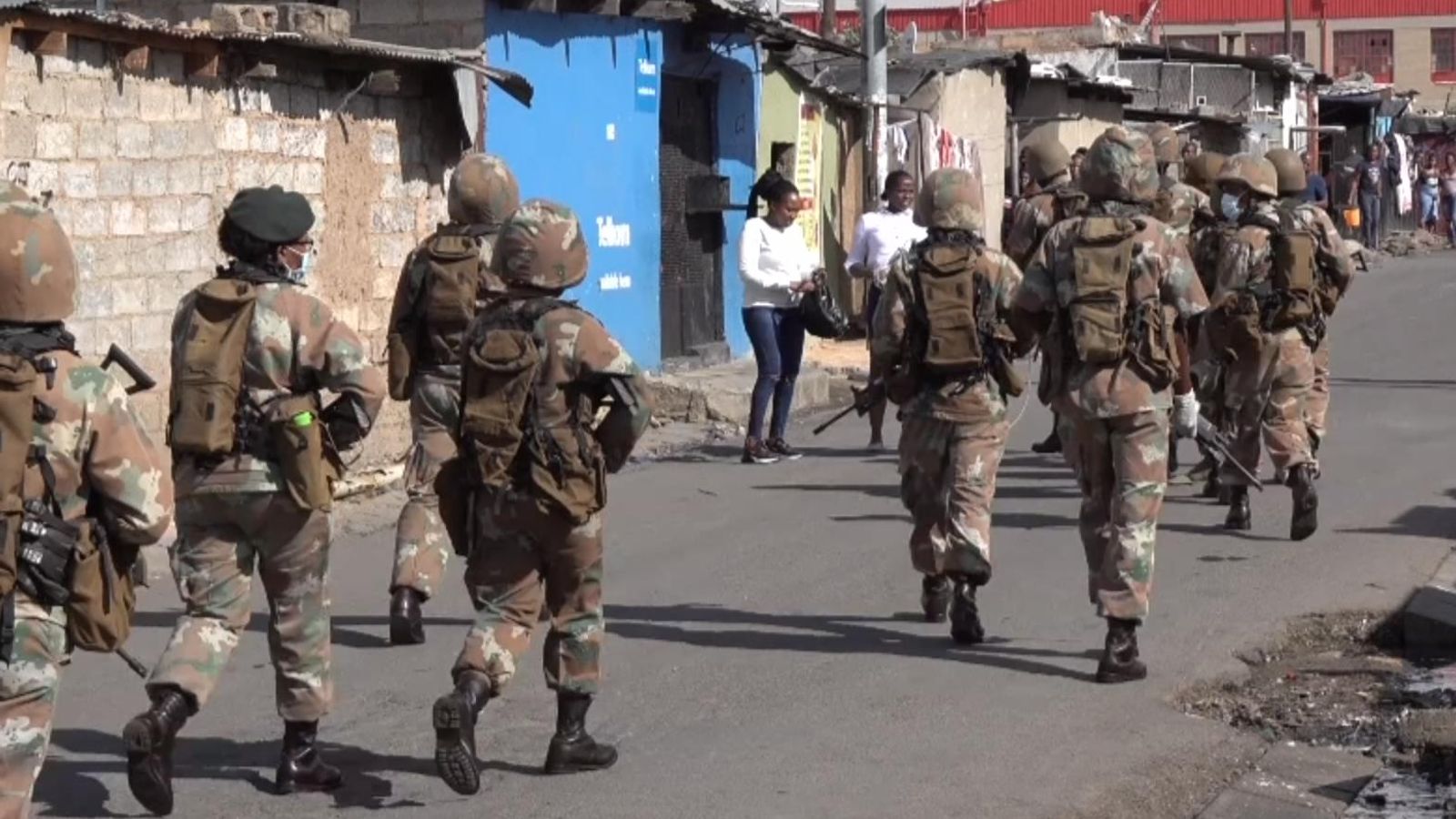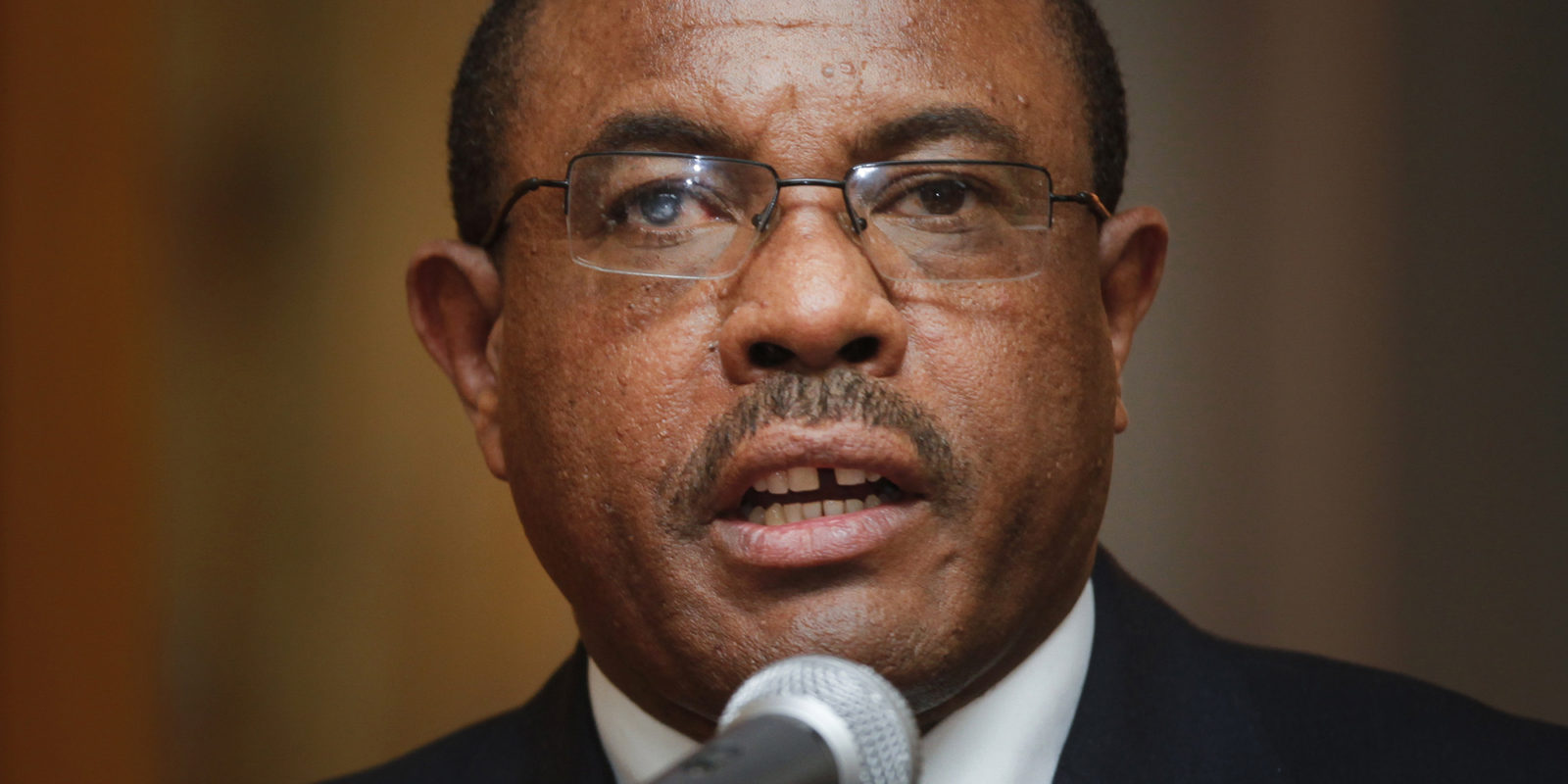News
Handing over authority to securocrats has made Ramaphosa's 'heavy cross' impossible to bear
The ripples of this pandemic will be felt heavily for decades. Handing over authority to the military has made it heavier.

Research Director, The Brenthurst Foundation

Director, The Brenthurst Foundation

A lockdown extension will, we hope, reduce the threat of transmission of COVID-19, and help to manage the immediate health crisis. But if COVID-19 does not get you, the economy might. Deliberate action and thoughtful leadership are required in both areas, in health as well as the economy. The early signs indicate that we are in for a bigger battle on the economic front than with COVID-19 itself.
We can say with certainty that all COVID-19 prognostications show that South Africa is now deep in the economic dwang. We urgently need a plan – and an offramp – from the interlinked health and economic crises, a route that does not simply dump the country near where it was before coronavirus rummaged the world, back to a low-growth, high-unemployment, high-crime dystopia, one in which social cohesion was faltering and the country was fast losing its global status.
The offramp must involve more than short-term mitigation focused on the extension of child support, food parcels or SMME bailouts but deep, structural reform.
Before the crisis, economic growth was forecast at 0.8%, on the back of 0.7% growth in 2019. Unemployment was effectively at 40%, and over 50% of young South Africans were out of work. Business confidence at the start of 2020 was at its lowest level in two decades. Since 1994, South Africa’s share of global per capita GDP has fallen from 78% in 2008 to 68%, just as government consumption as a share of GDP has risen inexorably by 14% over the last ten years.
And then there were the falling global ratings, an ever-ratcheting premium on borrowing.
These statistics are a stark reminder of how our ambitions to lead Africa and the world have fallen short. Instead of displaying how growth and national unity could rise out of apartheid division and dysfunction, the warm and welcoming political rhetoric is consistently at odds with the cold reality of policy ambiguity and weak delivery.
COVID-19 will push the economy firmly into recession, that much is certain. It’s only the depth and the extent of the recession that is arguable; for the moment it will most likely be in the -5% margin. Following the extension of the lockdown, some economists are predicting that as many as 1.6 million jobs will be lost in the formal sector by the end of the second quarter.
And it’s the effect of this contraction on social tension which is most concerning. This can only increase tension within the ranks of the ruling tripartite Alliance, which has maintained unity by feeding off an unrelenting diet of public service salary increases, unmatched by productivity and competitiveness gains. Hence the crumbling commanding heights of State-Owned Enterprises.
It’s become an Alliance which speaks for the poor but acts in the interests of the middle-class.
Any COVID-19 offramp worthy of the name has, tactically, to try to speed up economic activity while avoiding expediting transmission. It has to make all this happen soon, since every day lost comes with a further and increasingly unaffordable price tag. If the UK stimulus package for an economy nearly seven times South Africa’s size is (so far) $82 billion, as a guide we are going to need around $12 billion to ride out the bumps. let alone embark on necessary reforms.
Strategically, the offramp has to deliver the country to a different place than it was before the crisis. Whatever problems we had before, now they are flexing the muscles on steroids.
Here appears a fundamental and unresolved tension within the Alliance over the route:
One with the state at the centre, funded by a combination of international friends (the BRICS bank, or China, or both) and increased domestic taxation, where the state plays an even more central role in production and distribution, from retraining to establishing new infrastructure and financial architecture.
There is another option, of lower tax-rates to stimulate growth and reform of the state-sector including, for example, liquidating SAA and expediting the unbundling of Eskom and opening up to Independent Power Producers.
It is a choice between doubling-up on the state or on the private sector.
These options are not entirely at South Africa’s fingertips to the extent that they were before the virus. The options for global funding to patch up the economy may be a casualty of COVID-19, both as states focus inwardly and politics takes over.
Globalisation is in neutral right now and may shift into reverse as relations take on a Cold War tone and temperature. Already before COVID-19 there was an emerging consensus in the US that sees China as a strategic threat. Some 60% of Americans now have an unfavourable view of China, the highest number since Pew began polling on the question in 2005. Containment may have just, with COVID-19, be a more popular US policy option.
In an era of renewed global competition, one of the choices that may be forced on South Africa is to pick sides between China and the West, for which read the IMF, in its search for funds. It may not be possible to fudge that choice. Questions of global alignment link with other national interests. For all of the media hysteria around Trump’s fumblings in handling COVID-19, it is not clear about which global actors to which state should align as the most responsible in protecting the commons.
Should we be optimistic? Where does the balance of forces – the instinctive policy heart – of the ruling Alliance currently reside?
Pre-COVID-19, if there was no rent to be extracted (albeit in the name of economic transformation), pro-market reforms were as unpopular as the chances of South Africa asking for IMF money were unlikely.
Post-COVID-19, the statist tendency is obviously visible, at least in the shift in authority to the security forces.
The securocrats have never had it so good. Talk of wars and battles, de rigueur among the policy set in government, gives them a sense of institutional purpose and the space to flex their camouflage pecs. Allowing this has been a shockingly bad move, the long-term consequences of which, like that of COVID-19, are grave and uncertain. While these are extraordinary times, the government has transgressed every known rule of military assistance to civilian authority, the first of which is never to put soldiers on the street in a public-facing, law and order role. They are not trained for it, even in well-equipped and marshalled forces, which the SA National Defence Force is not by any stretch of the imagination. Rather they would be better off playing a backroom, supportive role, releasing the police onto the streets.
It’s not only in the township frontlines that the securocrats reign, but also evidently in the policy decisions of the government, including on which economic sectors should be open, and closed, and whether they will raise the threat of coronavirus transmission. They are no better epidemiologists, surely, than they are public order policemen, and at the latter they are evidently terrible, exponents of kragdadigheid of the sort last meted out by the apartheid state, if the reporting coming out of the townships is accurate.
This sort of behaviour and power-shift can only end badly. As the economic times toughen with the lockdown biting ever-deeper, maintaining law and order will become more problematic. When informal traders queued up in Johannesburg to get permits to operate, they were dispersed by soldiers. Here are desperate people attempting to beat starvation within the law being treated like criminals by soldiers who are not interested in their pleading, according to an SABC report. To keep order, soldiers need the respect of the governed, not unlimited force. To gain that, they must obey certain rules. Starting with their leaders, they need to understand the basics. A lockdown is not a curfew. Or a state of emergency. Civilians have rights. The soldiers and police are there to protect them. To do so you need to be a pillar of strength, not another threat in already difficult circumstances. They must always be kind and courteous. They are servants of the public, not sinister masters and commanders hiding behind face masks and balaclavas in a stomping, threatening, cursing frenzy of ill-discipline.
Instead of this approach, government could take a kinder, gentler path. It could allow informal traders to operate as before without the need for special permits – an action that causes large numbers of people to converge on government facilities in contradiction of the desire and duty to maintain social distancing.
It goes without saying that obtaining fruit and vegetables from an informal trader on your street is more at one with social distancing than standing in a crowded supermarket queue.

There are several other areas of the economy that have been needlessly affected by lockdowns.
Agriculture continues because food is viewed as essential. But the cut flower industry, which is part of the agricultural sector has been shut down. Surely the same safety rules could be applied in this industry to allow it to continue, saving permanent and seasonal jobs and allowing planting and cultivation to take place for the produce that will be sold once the lockdown is over?
The government could allow restaurants to continue to operate as food suppliers making contactless deliveries, giving them some income to tide them over, thereby saving thousands of jobs.
And it could look at ways of permitting businesses to operate online sales with contactless deliveries, adding little risk and enabling school children to purchase stationery and adult office supplies needed by those working from home.
There are other bans which have had unintended negative consequences. The ban on cigarette sales has played into the hands of syndicates that have a network in place to move their illegal products to smokers. Smoking is continuing, but it is being driven underground where there is no tax revenue and regulation and where syndicates involved in other crimes are enriched. The cynical would say this is no accident.
Should there be any uptick in the infection rate, such concessions could be reconsidered. But the imperative to save as many jobs as possible and to prevent the wholesale liquidation of the small business sector has to be a priority.
Instead, the government’s appetite for closing down society and policing it appears to expose a long-held fantasy of Soviet-style social control which the constitution has hitherto prevented from becoming a reality.
Perhaps anticipating this, President Ramaphosa made it very clear in his address to soldiers prior to the lockdown that they must behave with kindness towards the public. He was naïve. Once they were on the streets with their automatic weapons, they were always going to behave as soldiers are trained to – as combatants, with the public identified as an enemy.
“Trump,” Henry Kissinger wrote in 2018, “may be one of those figures in history who appears from time to time to mark the end of an era and to force it to give up its old pretences.”
The same could be said about COVID-19. The virus is going to make it impossible to avoid difficult choices, as leadership’s focus has to inevitably turn from ensuring inaction in the lockdown to promoting clear actions through reform.
The ripples of this pandemic will be felt for decades. It is, to use President Ramaphosa’s Easter terminology, a ‘heavy cross’. Handing over authority to the military has made it heavier. Lending weight to statists over reformers may make it impossible to bear. He needs to act now to free up the economy in steps to avoid turning the crisis into a calamity.
This article was originally published on The Daily Maverick.
Image credit: Sky News.

